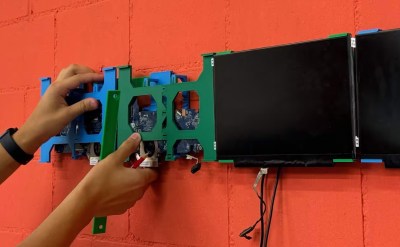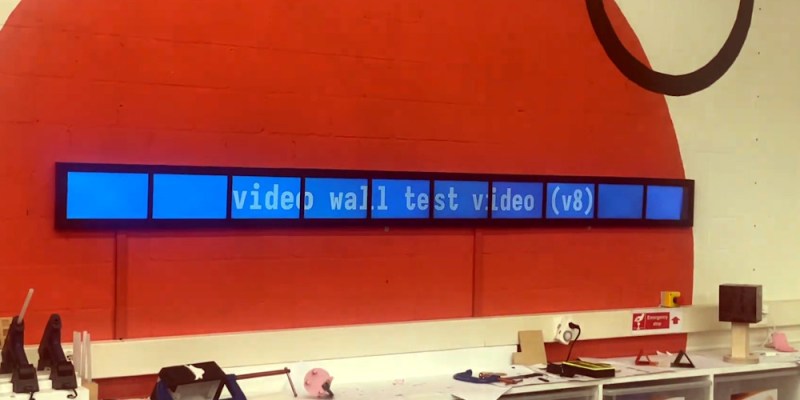What would you do with dozens and dozens of outdated Chromebooks that are no longer getting updates from the Google Mothership? It’s a situation that plenty of schools will have to deal with in the near future, and we can only help that those institutions have students as clever as [Varun Biniwale] and his friend [Aksel Salmi] to lean on — as they managed to recycle ten of these outdated laptops into an impressive video display.
There’s actually two write-ups for this particular story, with [Varun] documenting the modification of the Chromebooks and the software developed to play the video between them, and [Aksel] covering how the hardware was ultimately attached to the wall via bespoke 3D printed mounting brackets.
 The general idea with this project was to strip each Chromebook down to just a motherboard and an LCD, stick them on the wall, and then play the same video on all of them at once. This sounds relatively easy, but they quickly found out that the limited hackability of ChromeOS to be a limiting factor.
The general idea with this project was to strip each Chromebook down to just a motherboard and an LCD, stick them on the wall, and then play the same video on all of them at once. This sounds relatively easy, but they quickly found out that the limited hackability of ChromeOS to be a limiting factor.
So the decision was made to remove the physical write protection screws from each computer, which would allow for the installation of a standard Linux distribution. Once running stock Debian, it took some custom scripts to get each machine to boot up into Chromium and point at the appropriate web page. From there, socket.io is used to synchronize the playback of the carefully prepared video file.
On the other side of the project, [Aksel] shows the logistics of taking the machines apart and getting them ready for their new jig. Initial experiments focused on mounting the hardware to a laser-cut piece of acrylic, which looked good, but simply wasn’t robust enough. In the end, the solution was a highly customized 3D printed mount which holds the motherboard securely while also providing a place to attach each LCD.
End-of-life Chromebooks can be had for pennies on the dollar, and they’ll only become more common with time, so we’re eager to see what folks end up doing with them. Between the hardware and software aspects of this particular hack, we’re sure there’s a trick or two you’ll pick up from this one.
















I keep using my outdated Chromebooks, though I find that more and more websites break when I try to load them. I can no longer view a usable homepage on YouTube, anything from Reddit fails to load, Github is janky, and every time I type a comment on Facebook or in Facebook Messenger, the first letter is duplicated. But I can still watch YouTube videos if I have its URL, Hackaday works greatm and all the websites I maintain work just fine, since it isn’t hard to make a website work on an older Chromebook. RESIST EWASTE!
Just throw linux on em.
I have a bunch of EOL Chromebooks running linux that I use for projects. Quite a deal too at about $30 each.
Right on man – that’s what I’ve done and also some with shoehorned Chromium on them.
If you can install linux, another use is to turn it into a smart mirror. The mirror needs to be see-through one way, but it can be any size. Obviously the smart part will only be the size of the screen.
I have always wanted to build a starship bridge with one of every video device made—all NORAD style.
If nothing else—put these under a huge TOS ENTERPRISE screen and make them chaser lights
tfw nobody knows about the chultrabook, mrchomebox’s coreboot builds, and tinycore linux trifecta for keeping old chromebooks from being ewaste. mrchromebox’s firmware in particular kept my X131e chromebook useful for five more years than it would’ve been, considering how the school district who’d surplussed it hadn’t bothered to unenroll any old machines from their MDM, making it impossible to use normally.
I’ve tried a few Chromebook Linux installation hacks, and none of them quite worked quite the way I wanted (and some failed completely). But thanks, I will give this one a try! I have something like six or seven Chromebooks from various manufacturers, some of which are still getting updates. They’re great for light web browsing in a bathtub.
I have one in the closet I bring out every couple of years to cuss at and see the state of the world in chromebook solutions but had not come across the mrchromebox fw. Looks like I have a weekend project. Thanks for sharing! Much like Gus, I had tried a few distros and overlays but nothing that made it usable. I am excited after the first few reads on the mrcbfw and hope this solves a problem for the world. There are a lot of chromebooks out there.
Wow, that Mrchromebox site is packed with info. Quite the detailed procedure. Don’t have a Chromebook to mess around with but now I know what to try with it if I ever come across a tossed aside, unloved one!
More better is a ChromeBox with socketed RAM and SSD. Sometimes like a NUC. If you can get for $20 or something because it was locked to a corporate account. Firmware flashing doesn’t care about that.
There are even crazy ‘Google Meet’ boxes with esoteric hardware to hack.
Letting Google collect data and information from children at schools is amazingly irresponsible. Google are far more agressive than China for collecting information and data, they monitor and record everything, and are far more likely and able to use that private data in a way thats harmful. There will be AI bots popping up in the future based entirely on data collected from Individuals, including children. They will even look like the “subject” in video, hopefully they won’t be one of your children. This is a company that is now making AI that will lead to the killing of humans. Machines that will kill families and children included, although marketed for “defence” and to kill “enemies”, this will not be the case in reality. Google and lots of other “friendly” tech companies are not your friend.
This isn’t Twitter don’t enshitfy it with you political bias.
First sentence i agree with, dont support companies that generate and promote creating more trash. second bit, how enjoyable that may seem, produces more waste and supports violence against probably somewhat reusable electronics. Reuse, repair, properly recycle.
Reusability of those turds is next to none so there’s little loss in putting them out of their digital misery.
In theory, can one set a dedicated server to grab streaming video of some kind, split them up and pipe section to individual Chromebook, make it like a giant LCD panel? Or are sub-$50 used Chromebooks too slow to take data stream and put it on screen?
I tried this a while back, had a lot of trouble with the bandwidth required.
I’d love a system where you can load a video onto a server, which’ll copy the videos to the chromebooks and play them back using timecode to keep them all in sync.
Once you’ve loaded Linux on there, you’ve technically got everything you need. Just need to either find or make the software to actually manage that part of it…
This reminds me of PiWall
should’ve given me the chromebooks instead
It’s really about time for hardware and software to be forcefully decoupled. Anything I buy should come with the source code so it can be customised without reliance on the manufacturer.
Why would you remove comment about using those corporate turds for target practice with a pellet gun?
Be warned, only certain older model Chromebooks are compatible with MrChromebox’s firmware. Newer models have write protection that cannot be bypassed. I picked up a lot of 5 rugged ASUS C202SA Chromebooks off eBay for less than $100 a few years ago for my kids to each have a self-learning tool and me to have something to tinker with, along with spare parts. While Linux can be installed on that model, there are a lot of quirks that make it a bit frustrating, like the odd keyboard (there is a Chromebook layout in xkb, but it is geared towards other models) and finicky soundcard (doesn’t work with all distros and produces random loud chirps during login even with the ‘pcspkr=no’ kernel boot parameter set). Ultimately, one is much better off buying a laptop with similar specs as a Chromebook that comes with Windows preloaded, wiping the drive, and installing Linux on it than trying to do this with a Chromebook. It would be nice if ChromeOS Flex would run on them because then they could continue to be used as up-to-date Chromebooks, but their internal soundcards don’t work in Flex, which is frustrating because Google could add those drivers to their kernel if they were willing. Overall, my experience with Chromebooks has led me to never buy one again due to their limitations.
What’s wrong with VLC? Odd.
I see, not designed to sync multiple streams at the back end, and possibly not designed to cut up the video for sending over the network.